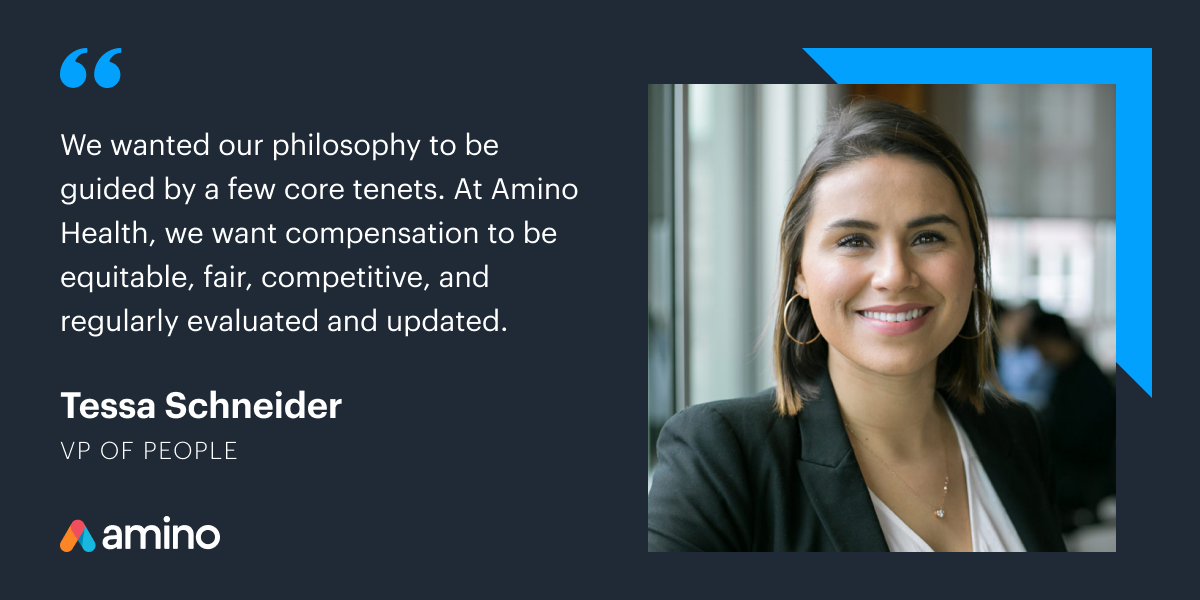
Amino Health is defining the digital-first healthcare guidance market with a platform that empowers plan members to make more informed healthcare decisions every time they seek care. The Amino platform makes it easy to find and book the right care at the right time—whether that’s through a covered healthcare benefit or a high-quality, cost-efficient care provider.
When Tessa joined Amino Health in February of 2021, building a compensation philosophy—a framework for compensation and the reasoning behind those choices—was a top priority to ensure the company was operating according to its values across its hiring and retention practices. She spoke with Carta about her design process and bridging theory and practice.
What went into Amino’s compensation philosophy:
-
Building equitable and competitive compensation that passes “the printer test”
-
Being fiscally responsible and reviewing regularly
-
Paying “for the job, not the location” as a fully remote company
When you first joined Amino, how did you approach putting together a compensation philosophy? Why is it important for a company to have a set philosophy, versus sending out offers piecemeal?
Amino Health has been around since 2013, but for the majority of that time, we have been staffed by fewer than 50 employees. Managers have always been super thoughtful about compensation given the resources they had available—but before I arrived, there wasn’t an official compensation strategy. Although we already felt confident about our compensation packages, I wanted us to feel even more confident, and have a philosophy—backed by data—that helped us live our values. I’ve been working on that philosophy for the last six to seven months.
I think a lot of companies have been making compensation strategies a priority because of increased competition over talent and increased focus on retention, with staff turnover increasing as a result of the Great Resignation. But for us, it’s also really about living our values, one of which is to act with integrity. And so we want to be able to say with integrity that we are paying the best we can and that we have data and a philosophy to back that up. That’s important to us.
As you worked on the philosophy, what priorities surfaced as most important?
We wanted our philosophy to be guided by a few core tenets. At Amino Health, we want compensation to be equitable, fair, competitive, and regularly evaluated and updated—at least for us, we want to be sure it’s something we look at every year, and likely more regularly than that, especially if someone’s a high performer or they’re a promotion case.
The last tenet is critical: We want our compensation philosophy to be fiscally responsible. The reality for any company is that the business mustshape both short- and long-term incentives, and there’s a fine balance to be struck there. Of course, you want to pay employees generous salaries, but you have to do so in a way that also honors their role as owners. As owners, employees trust us to be responsible with their investment, so the goal is to pay as competitively as possible while still maintaining an operating expenditure level that makes sense for the business. Making this a focus can also help ensure that everyone’s equity value increases as time goes on.
Amino is a fully remote company. How does that play into how you determine compensation?
This was one of the biggest things we focused on as part of the first phase of our compensation project—how to build a compensation program that reflected our distributed nature and supported the freedom that comes with being fully remote. My hope is that Amino is a chapter in our employee’s lives in which many employees can take that leap that they’ve been waiting to take, but haven’t because they’ve been tied to an office or a market with high-paying jobs. I love that our workforce is kind of nomadic; it makes our people happier and our community richer.
Ultimately, we decided to pay for the job, not for the location. We don’t differentiate between an engineer who lives in San Francisco and an engineer who lives outside of Nashville, Tennessee. They have the same pay ranges, which are based on Bay Area market rates. It is important that we financially support what it truly means to be a remote company: the opportunity for true flexibility.
How do you bridge theory and practice when it comes to compensation philosophy? How do you make sure the philosophy is applied to offers that go out and throughout the negotiation process? What are typically the biggest challenges when implementing a compensation philosophy?
One thing that my CEO and I talked about when I joined is the idea of “the printer test” and a focus on transparency. If somehow an Excel sheet of everybody’s comp got left on the printer at the (proverbial) office, we’d be OK with everyone seeing it. Our goal is to always feel confident that if somehow everyone’s pay was public, the team would see it and say, “Oh, that makes sense,” or “I get it, this engineer is making 10K more than me, but we’re both still in the salary band, they have five years more experience, and they have an advanced degree.”
Because the salaries are based on your philosophy, rather than one-off negotiating for each candidate?
Yes, and something that we started doing as a result of my time at Carta is first and best offers (rather than negotiating). This is an area where theory and practice become difficult. Because if you’re going to do first and best, then in some cases, you need to be comfortable with candidates walking away because they don’t like your first and best offer, and that’s scary.
But again, it comes back to integrity. It comes back to this idea of, “We want one candidate who’s maybe not as great at negotiating to get the same offer that someone who’s really savvy at negotiating would get.” On the whole, we try really hard to honor these structures that we’ve set up. And we know that sometimes there are risks with that, but we feel like the risk of inequity or the risk of failing the printer test is greater than the risk of one person here or there being disgruntled because we didn’t make an exception for them.
———
Build out your compensation philosophy with Carta Total Comp
Whether you’re putting together your company’s first compensation philosophy or revamping your plan to compete in a competitive job market, Carta Total Comp has the tools to help. Leverage quality, real-time data on salary and equity compensation from 25,000+ of private companies to craft a fair and competitive plan. Schedule a demo today. Read more about how to think about compensation philosophy and creating a compensation plan on the Carta blog.

